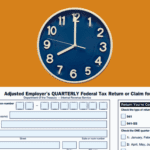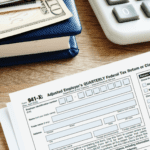Are you facing the daunting challenge of wage garnishment by the IRS? If so, you’re not alone. Dealing with wage garnishments can be a stressful and overwhelming experience, but don’t worry because you are far from alone in this struggle. Millions of Americans experience wage garnishment from the IRS, which can be even more aggressive than wage garnishments brought on by private collectors.
Wage garnishments can significantly impact your financial well-being, affecting your ability to meet basic needs and causing undue hardship. However, understanding the process and taking proactive measures can help you regain control over your income and resolve your tax issues.
Understanding Wage Garnishment
Understanding IRS wage garnishment is crucial for taxpayers as it allows them to be aware of their rights, responsibilities, and available options when dealing with unpaid tax debts. Being informed about the wage garnishment process empowers individuals to take proactive steps to prevent or stop the garnishment, thereby mitigating its financial impact. By understanding how wage garnishment works, taxpayers can make informed decisions, seek professional assistance, and explore alternatives to resolve their tax issues.
So, what exactly is an IRS wage garnishment? IRS wage garnishment is a legal process through which the IRS collects unpaid tax debts directly from an individual’s wages. When an individual owes back taxes and fails to resolve the debt through other means, the IRS can issue a wage garnishment order to their employer. This order requires the employer to withhold a portion of the employee’s wages and send it directly to the IRS to satisfy the outstanding tax liability.
Wage garnishment by the IRS can have a significant impact on your personal finances. The IRS has the authority to garnish as much as 70% of disposable income from an individual taxpayer’s wages, leaving you with a reduced income to cover your living expenses. The amount of the garnishment is determined based on the taxpayer’s filing status, number of dependents, and other factors. The garnishment continues until the tax debt is fully paid off or until the taxpayer takes action to stop or modify the garnishment through options such as negotiating with the IRS or entering into a repayment plan. It’s important to note that the IRS is required to provide notice to the taxpayer before initiating wage garnishment, allowing them an opportunity to address the tax debt before the garnishment takes effect.
Types of Debt That Can Lead to Wage Garnishment
Several types of IRS tax debt can lead to wage garnishment including unpaid income taxes, self-employment taxes, payroll taxes, trust fund recovery penalties, and even federal student loans. Being aware of the types of debt that the IRS can collect through wage garnishment is crucial for taxpayers to understand their potential exposure and take proactive measures to address any outstanding liabilities. By knowing which tax debts can lead to wage garnishment, individuals can prioritize their efforts to resolve these specific obligations and avoid the financial consequences of wage garnishment. It allows taxpayers to focus their attention on areas where they may be at risk and take necessary steps to prevent or halt the garnishment process.
Moreover, being informed about the types of debt subject to wage garnishment enables individuals to seek professional advice and explore available options for resolving their tax obligations. By understanding the specific tax debts that can trigger wage garnishment, taxpayers can engage with tax professionals, such as tax attorneys or enrolled agents, who specialize in resolving those types of tax issues. This targeted expertise can guide taxpayers toward the most effective strategies, such as negotiating with the IRS, setting up installment agreements, or pursuing other options for resolving their specific tax debts. Overall, awareness of the types of debt that the IRS can collect through wage garnishment empowers taxpayers to be proactive, seek assistance when needed, and take the necessary steps to address their tax liabilities before facing the serious repercussions of wage garnishment.
Steps to Take to Stop Wage Garnishment
There are many ways you can help your case regarding IRS wage garnishment, but the problem will not go away on its own until your debt is paid in full. These are some of the things you can do to help resolve your debt and eliminate your wage garnishment.
Respond to IRS Communications
Responding promptly to IRS communications is vital in stopping IRS wage garnishment. When the IRS sends notices regarding tax debts or potential wage garnishment, it’s crucial to take immediate action. Ignoring or delaying a response can escalate the situation and increase the likelihood of wage garnishment. By responding promptly, taxpayers have the opportunity to address the tax debt directly with the IRS, potentially resolving the issue before it reaches the garnishment stage.
Timely communication with the IRS demonstrates a willingness to cooperate and find a resolution. It allows taxpayers to provide any necessary documentation, present their case, and explore alternative options to wage garnishment. In some cases, responding promptly can lead to negotiations with the IRS, such as setting up a payment plan or negotiating an offer in compromise, which can help stop or prevent wage garnishment. By taking the initiative to engage with the IRS, individuals increase their chances of finding a mutually acceptable solution and avoiding the financial hardships that come with wage garnishment.
Evaluate Your Situation With a Professional
Evaluating your repayment options with a tax attorney can be instrumental in avoiding or stopping wage garnishment. A tax attorney brings specialized knowledge and experience in dealing with IRS tax debts, allowing them to assess your specific situation and explore the best strategies for resolving your tax issues. They can evaluate various repayment options available to you, such as installment agreements, offers in compromise, or currently not collectible status, and determine the most appropriate course of action to avoid or halt wage garnishment.
A tax attorney can navigate the complex IRS procedures and negotiate on your behalf. They can communicate with the IRS to present your case, provide the necessary documentation, and advocate for alternative arrangements that are more manageable for your financial situation. By working with a tax attorney, you gain a strong ally who understands the intricacies of tax law and can guide you through the negotiation process. Their expertise can help you explore all available avenues to resolve your tax debt and find a viable solution that prevents or stops wage garnishment, allowing you to regain control of your income and financial stability.
Request a Wage Garnishment Release
Requesting a wage garnishment release from the IRS can be a complex and challenging process, which is why it is essential to work with a tax resolution attorney. A tax resolution attorney brings specialized knowledge and experience in dealing with IRS tax debts and wage garnishments. They can navigate the intricacies of tax laws and regulations, ensuring that all necessary steps are followed accurately and effectively. With a tax resolution attorney by your side, you can be confident that your request for a wage garnishment release is handled professionally and in accordance with IRS guidelines.
The expertise of a tax resolution attorney can be precious during the negotiation process with the IRS. They can assess your specific financial situation, evaluate your available options, and present a compelling case to the IRS to support your request for a wage garnishment release. Whether you are facing financial hardship, have entered into a payment plan, or are exploring other tax resolution options, a tax resolution attorney can advocate on your behalf and work toward a favorable resolution. By having a tax resolution attorney handle your wage garnishment release request, you can alleviate the stress and burden of dealing with the IRS on your own and increase your chances of achieving a positive outcome.
Trust Steve Klitzner with Your Tax Troubles!
Are you struggling with IRS wage garnishment, feeling overwhelmed and unsure of where to turn? Take control of your financial future and seek the expert guidance of Steven Klitzner, a seasoned tax resolution attorney with a proven track record of helping clients overcome wage garnishment challenges. Don’t face the IRS alone—let Steven Klitzner be your advocate and navigate the complexities of tax laws on your behalf.
With years of experience in tax resolution, Steven Klitzner understands the intricacies of wage garnishment cases and can develop a personalized strategy tailored to your unique circumstances. Whether you’re dealing with financial hardship, seeking to negotiate a payment plan, or exploring other tax resolution options, Steven Klitzner has the expertise to protect your interests and find the best path forward.
Contact Steven Klitzner today for a confidential consultation and regain control over your finances. Don’t let wage garnishment hold you back—let a skilled tax resolution attorney like Steven Klitzner guide you toward a brighter, more financially secure future. Your relief from IRS wage garnishment starts here!







 Steven N. Klitzner, P.A. is a tax attorney based in Miami, Florida. He has been practicing tax law for over 40 years, and currently holds a 10.0 rating by Avvo. Mr. Klitzner was appointed to the IRS Service Advisory Council in 2021 and is...
Steven N. Klitzner, P.A. is a tax attorney based in Miami, Florida. He has been practicing tax law for over 40 years, and currently holds a 10.0 rating by Avvo. Mr. Klitzner was appointed to the IRS Service Advisory Council in 2021 and is... 





